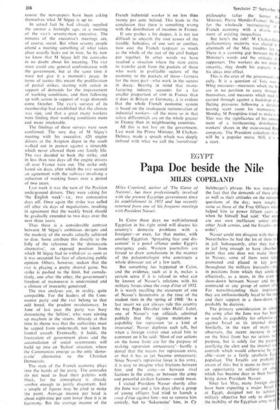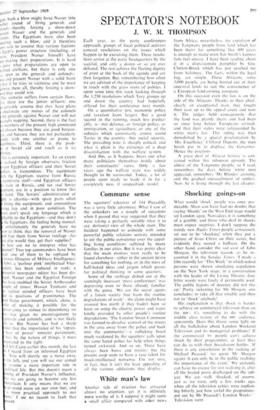EGYPT
Papa Doc beside the Nile
MILES COPELAND
Miles Copeland, author of `The Game of Nations', has been professionally involved with the present Egyptian government since its establishment in 1952 and has recently returned from one of his frequent meetings with President Nasser.
In Cairo these days no well-informed Egyptian in his right mind will discuss his country's domestic problems with a foreignerâor even, for that matter, with another Egyptian. 'Spreading fear and dis- content' is a penal offence under Egypt's emergency code. Western journalists are forced to draw conclusions in the manner of the palaeontologist who constructs a whole dinosaur out of a few teeth.
But something has happened in Cairo, and the evidence, such as it is, makes a certain sense if it is related to what can be known of Nasser's relations with his military forces since the coup d'etat of 1952. It is worth recalling the statement of one of Nasser's lieutenants at the time of the student riots in the spring of 1968: 'As a last resort we can always rule this country the way Papa Duvalier rules Haiti'. Later, one of Nasser's top officials admitted publicly that the regime maintains a capability for repression 'as a kind of insurance'. Nasser deplores such talk, but when a foreign visitor once asked him to comment on it he said: 'Most of our actions on the home front are for the purpose of making repression unnecessary'âhardly a denial that the means for repression exist, or that it has as yet become unnecessary. Since Nasser's repressive force is his army, it is easy to imagine what frictions between him and the armyâor between rival factions in the army, or between the army and powerful civilian factionsâcould mean.
I visited President Nasser shortly after the June war and a few days after a group of young officers had tried to launch a coup d'etat against himânot to remove him entirely, but to `Sukarnoise' him, in Cy Sulzberger's phrase. He was impressed the fact that the definands of these off as well as their attitudes on the outsta questions of the day, were roughly same as those of the Free Officers who helped him to power fifteen years a when he himself had said: 'Our ene are our own inefficient senior off other Arab armies, and the Israelisâin order'.
Nasser could not disagree with their Nevertheless he had the lot of them th in jail. Subsequently, after they had in jail long enough to have absorbs,: point that one does not make `den to Nasser, some of them were rely promoted and placed in key pt,h throughout the military hierarchyâth in positions from which they could effectively, as a team, in the event show-down between Nasser and the command or any group of senior oft For notwithstanding their imprison⢠they are enthusiastically loyal to the re and their support in a show-down %1 probably be decisive.
The, primary consideration in rebu the army after the June war has been so much its capability for offensive a against Israel as its internal disci Similarly, in the view of many W observers, the recent increase in to on the Sinai front has no serious MI purpose, but is solely for the purp justifying the alert and the internal se controls which would otherwise be in ableâeven to a fairly apathetic Et? populace. The Israelis are probably aware of this; but it seems to them to an opportunity to achieve an obi which has become dear to their heart+ bring down President Nasser. Since last May, many foreign obs have been expecting a major Israeli at Egypt, designed not to achieve military objective but only to demon the inability of the Egyptian army to d apt. Such a blow might force Nasser into anther round of firing generals and )10nelsâthereby forcing a show-down dween Nasser and the generals and )!onels. The Egyptians have also been xpecting such a blow, and it therefore :ems safe to assume that various factions Egypt's power structure (including, of purse. President Nasser himself) have ern making their preparations. It is hard ) Ness what preparations are open to narmed civilians, but there is only one ra open to the generals and colonels: Hite and present Nasser with a solid front that if he tries to victimise one he must timise them all, thereby forcing a show- na they could win.
This scenario suffers from certain flaws. rt. there are the junior officers: one
n certainly assume that they have plans checkmate any moves of the colonels the generals against Nasser and will not caught napping. Second, there is the fact at members of the present high command re chosen because they are good bureau- ats. and because they are not particularly endly with one another or prone to quishness. Third, there is the prob- of Soviet aid and (such as it is) luence.
This is extremely important. To an extent
t realised by foreign observers, friction tneen Egyptian officers and their Soviet 'pliers is tremendous. The equipment ich the Egyptians receive from Russia second-rate stuffâand Egyptian officers u train in Russia, and see real Soviet
uipment, are in a position to know this
ct hand. The Soviets' administration of ply is chaoticâwith spare parts often t fitting the equipment, and ammunition iving late and in poor condition. The lets don't speak any language which is Iligible to the Egyptiansâand they don't the Egyptians, the feeling being mutual. t unfortunately the generals have no son to think that the removal of Nasser uld free them from Soviet tutelageâfor ere else would they get their supplies?
o how are we to interpret what has pened? Two top commanders have been ed, one of them to be replaced by former Director of Military Intelligence: Sabri, a 'parlour pink' intellectual Vice- 'dent, has been reduced in rank: a monist newspaper editor has been dis- rped: Nasser and the Egyptian Foreign ice have snubbed the Soviet Ambassador ouple of times: Hassan Touhami and r rightist minded officers have been d to positions of prominence. The ted States government, which, alone, is able of making it possible for the ptian army to reduce its dependency on iaâhas given no encouragement to generals and colonels, and is not likely do so. But Nasser has had a sharp finder that the importance of his `repres- bae of power' remains paramount, that, by the nature of things, it must orientated to the right.
I left Cairo earlier this month, the last 1 heard from an informed Egyptian 'You will shortly see a move away the left, and you will see our armed assume a more important role in Political life. But this doesn't mean a ening of President Nasser's influence, hat we are going to become any less American. It only means that we are to stand more on our own feet, and a more practical approach to our ems.' I see no reason to fault that ment.







































 Previous page
Previous page